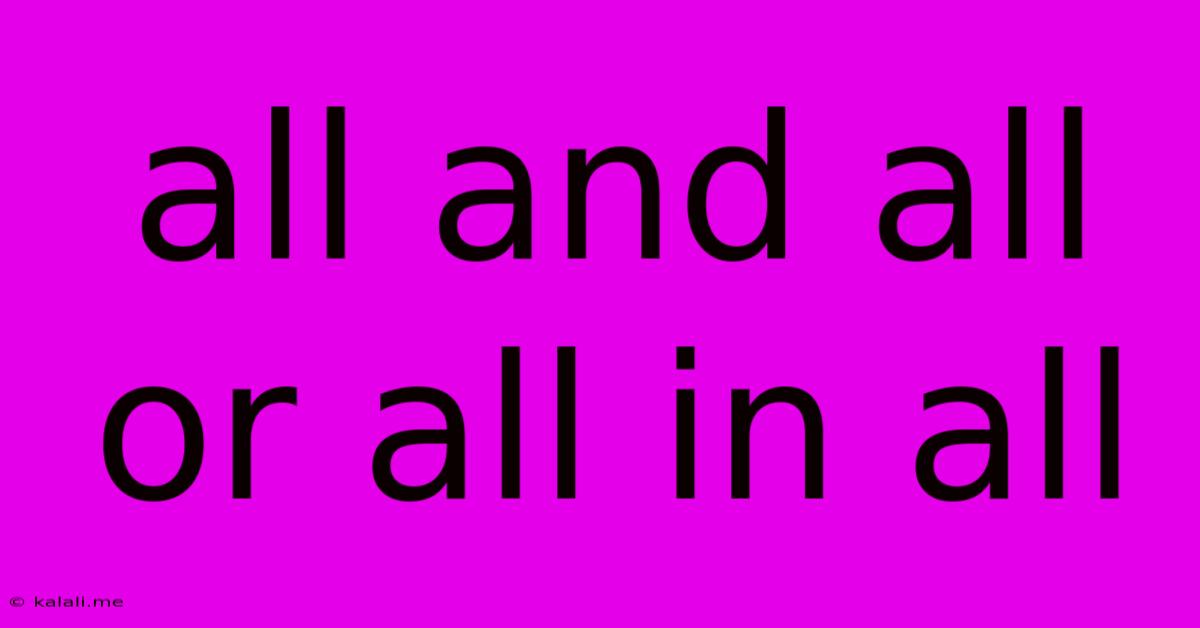All And All Or All In All
Kalali
Jun 01, 2025 · 3 min read

Table of Contents
All and All vs. All in All: Understanding the Nuances of These Phrases
Choosing between "all and all" and "all in all" can be confusing, as both phrases seem to convey a similar meaning of summarization or overall assessment. However, there's a subtle yet significant difference in their usage and connotation. This article will delve into the nuances of each phrase, helping you understand when to use one over the other and improve your writing clarity.
Meta Description: Confused about the difference between "all and all" and "all in all"? This article clarifies the subtle distinctions between these phrases, offering guidance on their proper usage in writing.
"All and All" – A Rare and Often Incorrect Usage
While grammatically correct, "all and all" is rarely used in modern English and is often considered incorrect or informal. It doesn't hold a clear, established meaning like "all in all." Its appearance usually signifies a speaker's attempt to create a summarizing statement, but it often sounds awkward and unclear. Avoid using "all and all" in formal writing or professional contexts. Instead, opt for clearer alternatives like "overall," "in summary," or "to sum up."
"All in All" – The Preferred Choice for Summarization
"All in all" is the preferred and widely accepted phrase for conveying an overall assessment or summary. It means "considering everything" or "in general." This idiom is versatile and can be used in both formal and informal writing, making it a much safer choice than "all and all."
Here are some examples illustrating the proper use of "all in all":
- "All in all, the conference was a success." This concisely summarizes the overall outcome of the conference.
- "All in all, it was a difficult year, but we learned valuable lessons." This conveys a general assessment of a challenging period.
- "The food was delicious, the service was excellent, and all in all, it was a wonderful dining experience." This summarizes a positive experience by considering all aspects.
Key Differences Summarized:
| Phrase | Usage | Formal/Informal | Clarity | Recommended? |
|---|---|---|---|---|
| All and all | Rarely used | Informal | Poor | No |
| All in all | Summarization | Both | Excellent | Yes |
Choosing the Right Phrase: A Practical Guide
To avoid confusion and ensure clarity in your writing, always choose "all in all." It’s the established idiom with a clear meaning and wide acceptance. Using "all and all" risks miscommunication and may make your writing appear less polished and professional. Remember, clear and concise language is key to effective communication.
Beyond "All in All": Alternative Phrases for Summarization
While "all in all" is excellent for summarizing, consider these alternative phrases for varied sentence structures and to avoid repetition:
- Overall: A simple and effective synonym.
- In summary: Suitable for more formal contexts.
- To sum up: Similar to "in summary."
- In conclusion: Typically used at the end of a piece of writing.
- Taking everything into account: A more formal and detailed alternative.
By understanding the nuances between "all and all" and "all in all," and by exploring alternative phrasing options, you can enhance the clarity, precision, and overall effectiveness of your writing. Remember, choosing the right words can significantly impact the reader's understanding and overall impression of your work.
Latest Posts
Latest Posts
-
List Of All 3 Digit Number Combinations 0 9
Jul 04, 2025
-
How Many Days Are In 40 Years
Jul 04, 2025
-
How Many Times Does 8 Go Into 3
Jul 04, 2025
-
What Does 925 Stamped On Jewelry Mean
Jul 04, 2025
-
How Do You Say 125 In Spanish
Jul 04, 2025
Related Post
Thank you for visiting our website which covers about All And All Or All In All . We hope the information provided has been useful to you. Feel free to contact us if you have any questions or need further assistance. See you next time and don't miss to bookmark.